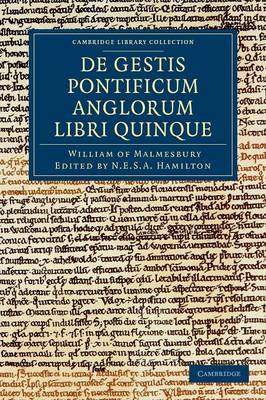Cambridge Library Collection - Rolls
2 primary works • 4 total works
Volume 1
De gestis regum anglorum libri quinque: Historiae novellae libri tres: Volume 1
by William Of Malmesbury
Published 15 November 2012
Consciously modelling himself on the Venerable Bede, William of Malmesbury (c.1090-c.1142) was one of the most learned of all the medieval chroniclers. His monumental Gesta regum anglorum ('Deeds of the English Kings') is a model of historical scholarship, written in engaging, fluid Latin. It was first completed around 1125, but was later revised and extended. The first two books of the Gesta are an impressive demonstration of William's extensive bibliographic and antiquarian knowledge. In this first volume of a two-volume set, originally published between 1887 and 1889, editor William Stubbs (1825-1901) presents these first two books, which narrate events from the arrival of the Anglo-Saxons to the Battle of Hastings. Stubbs' own lengthy preface is a detailed examination of William's life and work, which sets his historical writings in the context of his time and credits him as the first truly systematic historian since Bede.
Volume 2
De gestis regum anglorum libri quinque: Historiae novellae libri tres: Volume 2
by William Of Malmesbury
Published 15 November 2012
Consciously modelling himself on the Venerable Bede, William of Malmesbury (c.1090-c.1142) was one of the most learned of all the medieval chroniclers. In this second volume of a two-volume set, published between 1887 and 1889, editor William Stubbs (1825-1901) presents the last three books of William's Gesta regum anglorum ('Deeds of the English Kings'), which are concerned with post-Conquest events up to the reign of Henry I. Although William's reliance on contemporary chroniclers makes these books less independently valuable, they nonetheless contain much interesting material drawn from the author's own experience. The Gesta is followed by the Historia novella ('Modern History'), a later work in annalistic form - covering events from 1128 to 1142, including the 'anarchy' of King Stephen's reign - which seems to have been unrevised and unfinished before William's death. Stubbs' substantial preface provides a detailed critique of the literary and historical value of William's Latin writings.
Willelmi Malmesbiriensis Monachi De gestis pontificum Anglorum libri quinque
by William Of Malmesbury
Published 15 November 2012
William of Malmesbury (c.1090-c.1142) was a prolific historian and a trustworthy chronicler, described by Professor R. M. Thomson as 'the most learned European of his day' and 'England's greatest national and local historian since Bede'. A Benedictine monk, he spent his adult life at Malmesbury Abbey, where he assisted the Abbot in founding the library, and devoted his time to writing. The Latin text presented here, originally published in 1870 as part of the Rolls Series, is based on the manuscript at Magdalen College, Oxford. It is described with confidence by N. E. S. A. Hamilton as 'no other than Malmesbury's own autograph' - a claim which the editor backs up in his comprehensive preface. Revised and added to over a period of ten years following its completion in around 1125, this early ecclesiastical history of England is as much a historical record as a primary source in its own right.
De gestis regum anglorum libri quinque: Historiae novellae libri tres 2 Volume Set
by William Of Malmesbury
Published 15 November 2012
Consciously modelling himself on the Venerable Bede, William of Malmesbury (c.1090-c.1142) was one of the most learned of all the medieval chroniclers. His monumental Gesta regum anglorum ('Deeds of the English Kings') is a model of historical scholarship, written in engaging, fluid Latin. First completed around 1125, it was later revised and extended. Volume 1 of this two-volume set, originally published between 1887 and 1889, presents the first two books of the Gesta, which cover events from the arrival of the Anglo-Saxons to the Battle of Hastings. Volume 2 presents the last three books, covering post-Conquest events up to the reign of Henry I. This is followed by the Historia novella ('Modern History'), a later work in annalistic form which covers events from 1128 to 1142, including the 'anarchy' of King Stephen's reign. Editor William Stubbs (1825-1901) provides substantial analysis of William's life and work in his prefaces.

